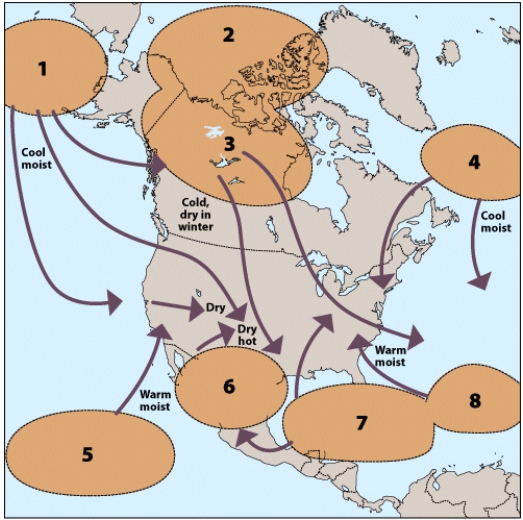Exam 6: Weather Systems
Exam 1: Discovering the Earths Dimensions104 Questions
Exam 2: The Earths Global Energy Balance129 Questions
Exam 3: Air Temperature157 Questions
Exam 4: Atmospheric Moisture and Precipitation132 Questions
Exam 5: Global Atmospheric and Oceanic Circulation138 Questions
Exam 6: Weather Systems130 Questions
Exam 7: Global Climates and Climate Change148 Questions
Exam 8: Earth From the Inside Out79 Questions
Exam 9: Plate Tectonics, Earthquakes, and Volcanoes79 Questions
Exam 10: Weathering and Mass Wasting56 Questions
Exam 11: Fresh Water of the Continents67 Questions
Exam 12: Land-Forms Made by Running Water59 Questions
Exam 13: Landforms Made by Wind and Waves65 Questions
Exam 14: Glacial and Periglacial Landforms105 Questions
Exam 15: Global Soils137 Questions
Exam 16: Biogeographic Processes105 Questions
Exam 17: Global Biogeography142 Questions
Select questions type
A weather front along which a moving warm front has overtaken a cold front, forcing the cold air mass aloft, is called an occluded front.
Free
(True/False)
4.8/5  (28)
(28)
Correct Answer:
False
In the North Atlantic, the peak of hurricane season occurs during:
(Multiple Choice)
4.9/5  (38)
(38)
As a warm front moves, it rises up over colder air which can produce extensive stratus cloud development.
(True/False)
4.9/5  (41)
(41)
Types of anticyclone include wave anticyclones, tropical anticyclones, and tornados.
(True/False)
4.8/5  (37)
(37)
An air mass is a spiraling flow of air that blows inward towards a central area of low pressure.
(True/False)
4.9/5  (28)
(28)
The air mass found in the area labeled 8 would be designated: 
(Multiple Choice)
4.9/5  (40)
(40)
The city of New Orleans was badly damaged in 2005 as a result of hurricane:
(Multiple Choice)
4.8/5  (38)
(38)
An air mass that formed over the Gulf of Mexico would be classified as a maritime equatorial air mass.
(True/False)
4.9/5  (30)
(30)
The surface of contact between two different air masses is called an occlusion.
(True/False)
4.8/5  (38)
(38)
A weather front along which a moving cold front has overtaken a warm front, forcing the warm air mass aloft, is called an occluded front.
(True/False)
4.8/5  (39)
(39)
In an anticyclone, rising air is warmed adiabatically so there is little condensation and skies tend to be mostly clear.
(True/False)
4.7/5  (32)
(32)
Weak cyclones are associated with little more than a period of cloud cover and light precipitation.
(True/False)
4.9/5  (33)
(33)
Which of the following air masses would be likely to contain the most water vapor?
(Multiple Choice)
4.8/5  (34)
(34)
Showing 1 - 20 of 130
Filters
- Essay(0)
- Multiple Choice(0)
- Short Answer(0)
- True False(0)
- Matching(0)